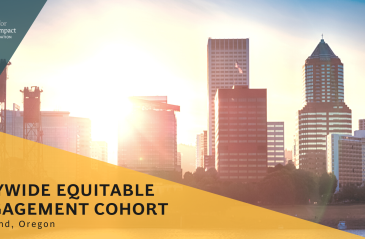
Five things we recently learned about difficult conversations

How can governments make themselves fit for the future? By looking for human, not technical, solutions, says @elenabagnera
Share articleThe @BennettInst is poised to train policymakers and help remake public policy – but how will it best be able to turn ambition into reality?
Share articleThere is a shared responsibility to engage with policy on a deeper level, question assumptions and rethink governance, says @elenabagnera
Share articleWe put our vision for government into practice through learning partner projects that align with our values and help reimagine government so that it works for everyone.
Last Monday I went to Cambridge University to attend the launch of the Bennett Institute for Public Policy.
Not content with aiming to train the next generation of policymakers - itself a lofty and important ambition - the institute's mission also involves rethinking public policy in an era of turbulence and growing inequality. Talk about aiming high.
The launch was not short of impressive speakers, and no doubt that every attendee left the event laden with some thought-provoking ideas. But from my own perspective, one in particular resonated strongly: Remaking public policy in the 21st century should be less technical and more human.
As its director, Professor Michael Kenny, said: “It is time to set aside the ingrained assumption that there are technical fixes or ready-made solutions to our most intractable problems”. In other words, if we are serious about remaking public policy, we need to look for human, not technical, solutions.
Now, this sounded very familiar. Last month, we published a report specifically entitled Finding a More Human Government, which laid out the importance of empathy and for governments to be more caring. So, what does the Institute think about this? How exactly can governments become more human and less technical?
We need a drastic revision of the goals and measures of public policy. GDP has long been seen as the key criteria for a country's success and prosperity. But what does it really tell us about a person's quality of life and well-being? As the economist, Michael Spence, says, probably not much.
Yet, the measurements that policymakers use for public policy have extensive implications - they shape our understanding and judgements about society. As Professor Diane Coyle told us on Monday: “We measure what we see and we see what we measure”.
This means that remaking public policy in the 21st century must start with a redefinition of the goals that governments want to achieve for their people. And policymakers might well start by asking people directly. What does success in society look like? What are the sort of things that matter most for quality of life? Only then can we identify the appropriate measurement lens for society.
Reducing poverty and inequality requires a better understanding of the psychological repercussions and narratives associated with poverty.
Shame is a good example. In societies where people widely believe that wealth comes with entitlement, and where expressions such as “benefits scroungers” exist, disadvantage is linked to shame. And the feeling of embarrassment can drastically reduce the likelihood of someone asking for help. If taken into account at all, these considerations only come as an afterthought in policymaking.
Policymakers, therefore, have a responsibility to gain a deeper understanding of the human factors underlying poverty and integrate them at the core of policy design. They could start by recognising distorting narratives about poverty, which unconsciously or not affect most of us, and devising ways to counteract them.
There is also a growing need for city planners to replace the dominant mobility-first approach with one that is people-first. Efficiency, in the form of enabling cars to get to their destinations in the fastest possible way, has certainly brought about benefits. But it does not necessarily create places where people want to live a meaningful life.
Liveable, lively and healthy cities are built when people's needs and aspirations are taken into account first. Admittedly, this can mean more and bigger roads. But it can also mean more pavements, bicycle lanes, and pedestrian plazas - something to bear in mind when making decisions about urban spaces.
If the prospect of climate change is going to change people's attitude and behaviour anytime soon, policy narratives need reframing. The technocratic optimism of the past twenty years, where there was an assumption that magic technologies would somehow fix the problem of global warming, has failed as a call to action.
Environmental policy in the 21st century must place the question of “why does this matter for people” at its core. “Warming” and “rising sea levels” are too abstract. But talk of global increases in migration, growing risks to investment/infrastructure and food insecurity resonate far more powerfully, and this can bridge the gap between policy and action, something we explored through CPI's Public Impact Fundamentals.
The Institute's existence reflects academia's growing sense of responsibility to respond to evolving social, political and economic conditions.
And while it will be fascinating to see its impact and how it develops in the coming years, the approaches it has already set out highlight the shared responsibility for all of us to engage with policy issues on a deeper level, question ingrained assumptions and rethink governance structures for the 21st century.
While we can all agree that technical advances are a vital, exhilarating component of any modern society, sometimes it takes a human touch - and government is no different.
What is legitimacy to you? Where do you see legitimacy working well? How governments work with citizens to build legitimacy is a big question for CPI.
Find out how to get involved in our Finding Legitimacy project
What is legitimacy to you? Where do you see legitimacy working well? How governments work with citizens to build legitimacy is a big question for CPI.
Find out how to get involved in our Finding Legitimacy project











